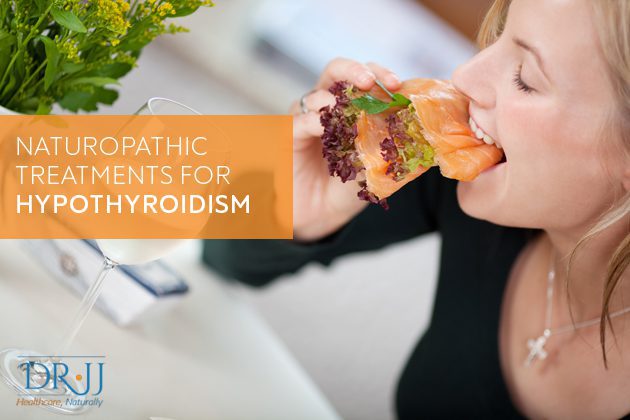
Amidst the incredible complexity of the human body lies a tiny but mighty gland, which plays a pivotal role in your overall health and wellbeing.
It’s your thyroid, a small butterfly shaped gland located in the front of your neck.
It serves as a master conductor, regulating essential processes that keep you energized, mentally sharp, and physically fit.
But when it underperforms, this leads to a complex and often misunderstood condition called hypothyroidism.
Unfortunately, hypothyroidism often slips by unnoticed, until the effects become too prominent to ignore.
Hypothyroidism is truly a silent and widespread condition that affects millions of people worldwide.
But naturopathic medicine can help.
As a naturopathic doctor in Toronto, let’s navigate the details of hypothyroidism.
What it is, what causes it, and what naturopathic solutions can help.
What Is Hypothyroidism?
Your thyroid gland is responsible for producing hormones, namely thyroxine (T4) and triiodothyronine (T3).
These hormones play a significant role in regulating numerous bodily functions.
But just like any endocrine organ, it can both underproduce and overproduce hormones.
Today we’ll look at underproduction – hypothyroidism.
This condition is also called underactive thyroid.
Hypothyroidism is often referred as a ‘silent’ condition, since its early symptoms tend to be subtle.
This can lead to delayed diagnosis and treatment.
How Do You Know If You Have Hypothyroidism?
Because symptoms of hypothyroidism tend to develop slowly, usually over several years, you may barely notice any symptoms at first.
Let’s take a good look at the subtle yet important signs and symptoms:
- Chronic fatigue
- Unexpected weight gain
- More sensitivity to cold
- Dry skin and coarse hair
- Muscle aches and stiffness
- Joint pain
- Depression and mood swings
- Irregular menstrual cycles
- Constipation
- Puffy face
- Hoarse voice
- Hair thinning on your scalp and on the outside of your eyebrows
RELATED: Naturopathic IV Therapy For Chronic Fatigue And Fibromyalgia
Early detection and proper management of hypothyroidism can greatly improve your overall quality of life.
How Do You Get Hypothyroidism?
Anybody can develop hypothyroidism.
However, it’s most common in women age 50 or older.
The most common cause is Hashimoto’s thyroiditis, an autoimmune disorder that triggers your immune system to attack your thyroid.
Your immune system creates antibodies to attack your thyroid tissue, which causes white blood cells to build up in your thyroid.
This causes inflammation in your thyroid, and over a long enough period of time it triggering the symptoms of hypothyroidism.
Other than that, hypothyroidism can be caused by:
- Certain medications, including lithium, tyrosine kinase inhibitors, and amiodarone among others
- Radiation therapy for cancer
- Pregnancy
- Pituitary gland disorders
- Iodine deficiency
If you have thyroid cancer, it may be necessary to have your thyroid removed.
This is called a thyroidectomy, and it will of course trigger hypothyroidism symptoms.
Naturopathic Treatments For Hypothyroidism
Currently, there is no known cure for hypothyroidism.
But that doesn’t mean there aren’t any treatments available.
Naturopathic treatments offer a holistic and proactive approach to managing hypothyroidism.
The goal is to support the innate healing capacity of your body, address the root causes of your health concerns, and restore balance to your system.
Let’s take a look at how to manage your hypothyroidism, naturally.
1. Eat These Foods…
If you’re dealing with hypothyroidism, focusing on specific foods can play a significant role in supporting your thyroid health.
Opt for iodine rich options like fish, dairy products, and seaweed, as iodine is essential for proper hormone production.
Prioritize antioxidants to protect your thyroid from oxidative stress.
These include:
- Vitamin E
- Vitamin C
- Selenium
- Glutathione
- Quercetin
- Zinc
- And others
Omega 3 fatty acid rich foods like fatty fish, flaxseeds, and walnuts can help alleviate inflammation.
Lastly, get enough protein, especially from tyrosine rich foods, to maintain energy levels and support muscle function.
Tyrosine is an amino acid needed to make thyroid hormones T4 and T3.
Sources include lean meats, dairy products, poultry, and plant based sources like sesame seeds, pumpkin seeds and legumes.
Remember that while certain foods can provide notable benefits, there’s no one size fits all approach to managing hypothyroidism and diet.
A personalized and holistic strategy is the key to effectively supporting your thyroid health.
2. …And Avoid These Foods
It’s just as important to watch for foods that can hinder your thyroid.
Highly processed foods are full of refined sugars and unhealthy fats.
These can disrupt hormone production and metabolism, potentially exacerbating your condition.
Similarly, cruciferous vegetables, like broccoli, cauliflower, and cabbage, can interfere with thyroid hormone synthesis, but only when you eat them in large amounts.
It’s not a bad idea to try a gluten free diet as well, since if you have hypothyroidism, you’re more likely to be sensitive to it.
Finally, go easy on the coffee and the booze.
They can disrupt your sleep patterns and cause issues with nutrient absorption.
While not totally off limits, it’s wise to moderate your intake of these foods.
3. Get Enough Iodine
Iodine is crucial in the synthesis of thyroid hormones, making it an essential nutrient for optimal thyroid health.
Iodine deficiency is quite rare, however, and most people get enough through their diet.
The easiest source to get iodine in your diet is through iodized salt, but most people eat too much salt in their diet as it is, so it’s not the best health advice to recommend eating more of it.
Instead, try eating more of the following:
- Eggs
- Seaweed
- Dairy products
- Shrimp
- Cod
- Canned tuna
- Beef liver
- Chicken
But it’s important not to eat too much iodine – that can be harmful to your thyroid as well.
4. Get Enough Zinc
Zinc is an essential nutrient in the conversion of inactive thyroid hormone (T4) to active thyroid hormone (T3).
The conversion is vital for the thyroid to carry out its functions properly.
Most people can get enough zinc through their diet, by eating more:
- Beef
- Chicken
- Shellfish
- Spinach
- Pumpkin seeds
As mentioned above, it’s also an antioxidant, so you’ve got that extra bit of thyroid support there too.
5. Get Enough Selenium
Selenium is another mineral your thyroid needs to produce hormones.
Brazil nuts, tuna, eggs, and sunflower seeds are good sources of selenium.
But just like with zinc, too much selenium is bad news as well.
It can cause nausea, vomiting, bad breath, hair loss, nail discoloration, and fatigue.
Possible Complications From Hypothyroidism
When left untreated, hypothyroidism can lead to various possible complications that adversely affect your overall health.
One common issue is weight gain.
An underactive thyroid can slow down your metabolism and lead to difficulty in shedding extra pounds.
It can also cause cardiovascular issues.
These include high blood pressure (hypertension) and elevated LDL cholesterol levels.
RELATED: Intravenous Therapy For Hypertension
It can also affect cognitive function, with symptoms such as forgetfulness, difficulty concentrating, and brain fog.
During your menstrual cycle, you may also have some issues, which can affect fertility.
RELATED: Naturopathic Infertility Treatment For Men And Women
In very rare cases, a life threatening condition called myxedema coma can happen when a severe underactive thyroid goes without treatment for a long time.
This can lead to confusion, hypothermia, and drowsiness, followed by an extreme lack of energy and then unconsciousness.
If you or someone you know is experiencing a myxedema coma, get to the nearest emergency room right away – it can be fatal.
Questions? Ask Dr. JJ!
As you can see, managing hypothyroidism naturally can be complicated.
But it can go a long way toward managing your condition.
We don’t yet have a cure for hypothyroidism, but naturopathic solutions can help keep your condition in check, so you can continue enjoying a full, healthy life.
If you’re considering naturopathic treatments for hypothyroidism, book your appointment with me, Dr. JJ, today.
If you have questions about naturopathic medicine, or you’d like to take your first step into the world of naturopathy, contact me, Dr. JJ, and let’s book an appointment.
Yours in health,
Dr. JJ Dugoua, Naturopathic Doctor
600 Sherbourne St, Suite 315,
Toronto, ON M4X 1W4
-https://goo.gl/maps/6VDXwiCihRpDRo5A9
Dr. JJ Dugoua is a naturopathic doctor in Toronto and has a PhD in Pharmaceutical Sciences. His clinic provides solutions for many health concerns and has a special focus on thyroid health issues.



